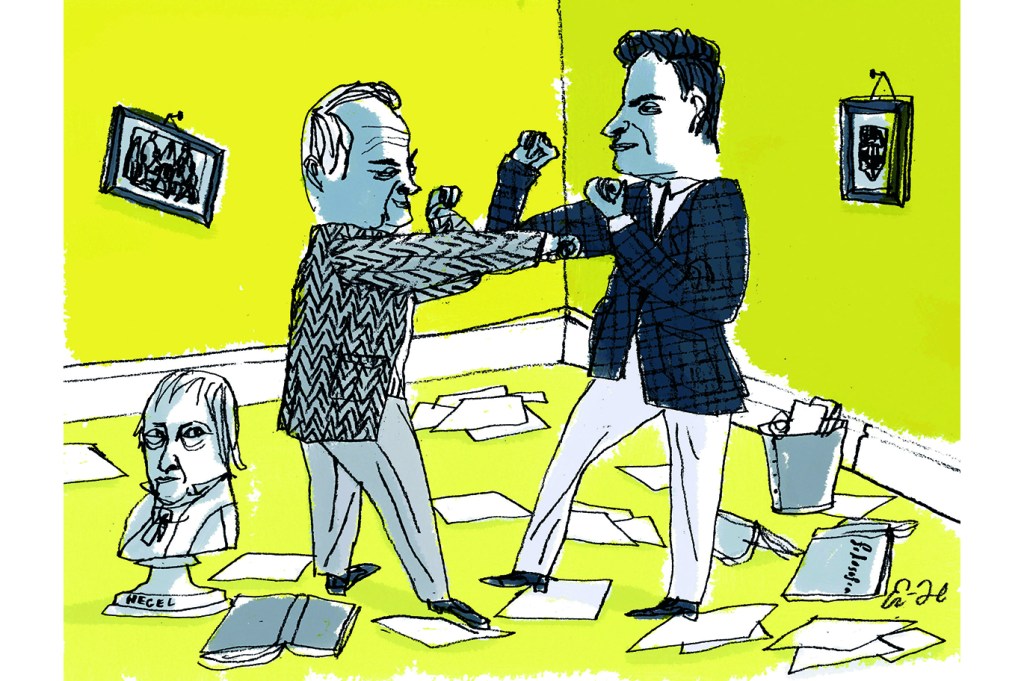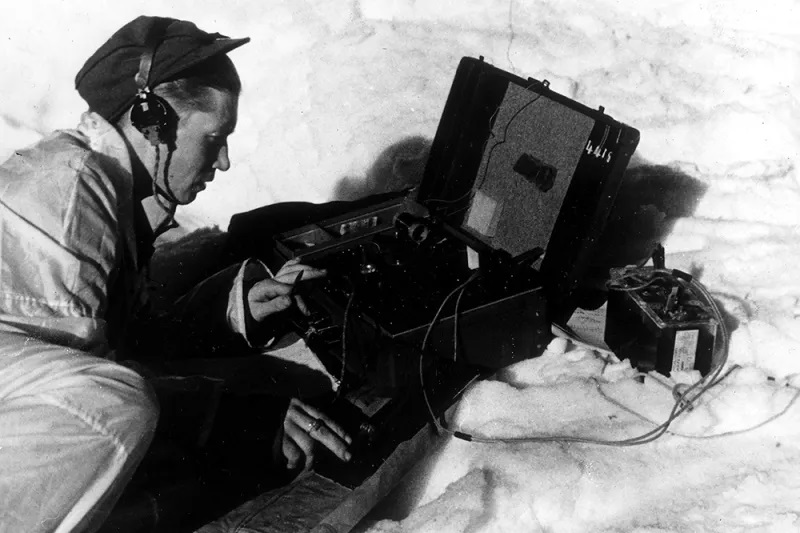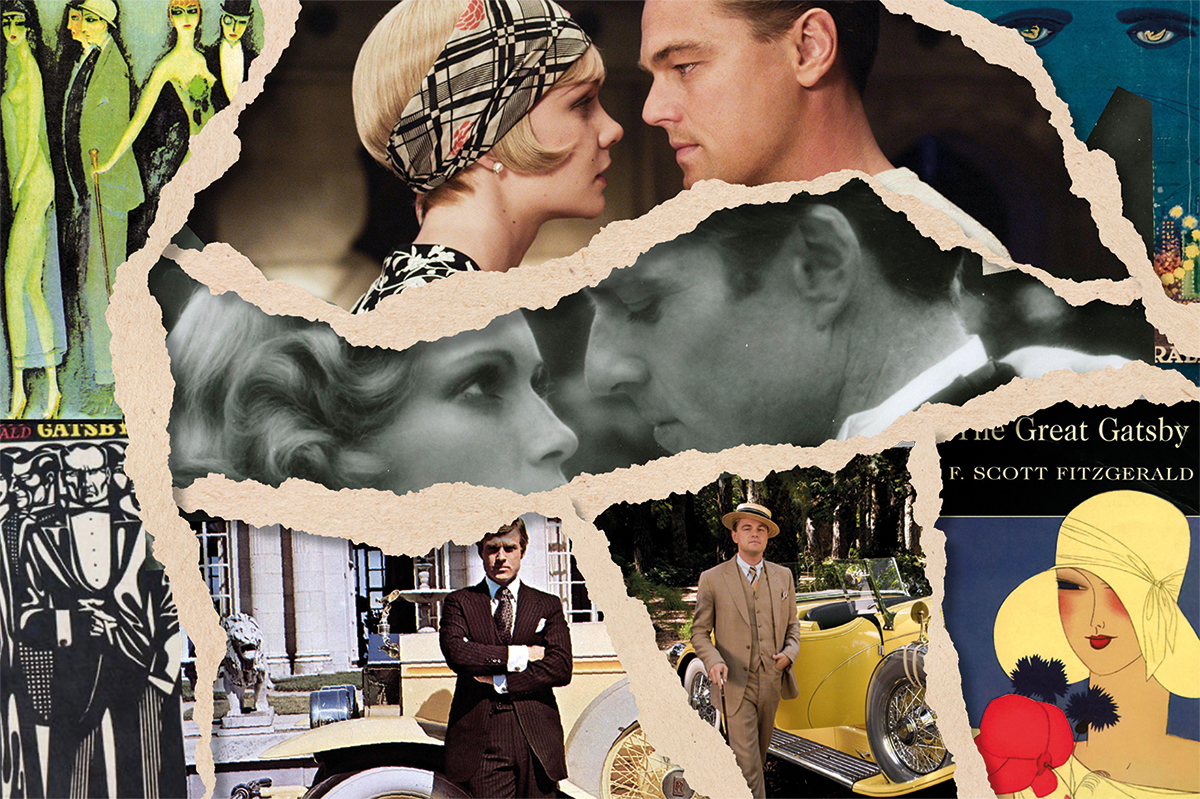Dear George,
I met you first in 1965. You had just given a lecture at the Royal Society of Literature’s premises. You were outspoken in declaring the merits of reticence. Ardent for cool, you insisted that, when writing about sex, the explicit, licensed by the verdict in the Lady Chatterley trial, was the enemy of art. Never mind Sir Robert Walpole’s ‘Let us talk bawdy, then all may join in’: obscenity was one thing, literature another. The naming of parts, in your view, belonged only in the kind of book which Jean-Jacques Rousseau held to be read with one hand. You commended the artful image of Dorothea in Middlemarch, attempting to reignite the embers in the fireplace of the conjugal home she shares with the burned-out scholar Casaubon; her frustration, his impotence encapsulated in domestic detail.
Annotators came to refer to you as a ‘Holocaust survivor’, as if you had been in one of the camps. Yes, in those cool days you bore fervent witness to the murderous Nazi dominion over most of Europe, but you, having moved with your parents to New York, had been no more in danger than I was, in London during the Blitz; less in fact. Our fortunes were shaded by events to which, as children, we were marginal. In Paris in 1939, your banker father insisted that you not hide your 10-year-old eyes when fascist marchers tramped down your street in the 16th arrondissement. You were to stand on the terrace with him and observe History and malevolence marching in step. Hegel, you remember, watched Napoleon, impersonating destiny, prance on his high horse on the way to Moscow and disaster. In 1940, you were off to New York, not long after my parents and I had left it. You were an ousted European; you traveled first-class. I, Chicago-born, have no call to be grateful for having been admitted to England. My father was a British subject; so then was I.
Mastery of despoiled languages paraded your European provenance. Great books, even (especially?) by malign authors, were your gospel: you preached Heidegger, not Wittgenstein. Impersonating a Trilingual Loeb edition, you were bent on caulking and reconciling cultures scored and scarred by greed and vandalism.
Bostonian hauteur fashioned you into a second Henry James, of whom T.S. Eliot said that he wrote with magisterial authority in a European language of no specific location. Someone might well have said ‘So look who’s talking’, but Uncle Tom had a censor’s clamp on English letters until, decorously as may be, you indicted his anti-Semitism in In Bluebeard’s Castle (1970). Robert Graves had biffed Pound, draft dodger and howler-prone translator, but no one had pounded Eliot.
You had the wit to see, the nerve to say, that European anti-Semitism was not so much about the murder and spoliation of hounded and confounded actual Jews as a reaction against the inoperable inner Jew, sewn into gentiles by Christianity. Ardor was fueled by resentment that dared not speak its name. Reveling in singular duplicity, you read Eliot’s lines — rats beneath the piles, ‘The jew is underneath the lot’ — as a sullen confession that Christian civilization was founded on Jewish premises. Hegel all but conceded as much and damned the Jews at the same time. You once told me that when stuck for a pertinent obscurity, you would attribute some knotty fausse-trouvaille to Hegel. His works were too voluminous for any bookish Javert to have time to prove your citation definitively spurious.
You spoke early in your career of the decline and imminent fall of The Novel. How keen you were that whatever was beyond you be outmoded! All your books were glosses, were they not, a layman’s Talmud, 100 percent Hebraic, as Wittgenstein said belatedly, if ruefully, of his own work? Only in much later years did you murmur that you had lacked the nerve to be an original artist. Meantime, playing Lord High Executioner, you exulted. Sophisticated by-the-wordiness in the New Yorker paid very well. You combined polyglot condescension with hireling anxiety: any change at the top might bring some keen new blade — like that of the swift Chinese headsman who said ‘Kindly nod’ — to sever you from prestigious gold.
How odd that your body, distorted at birth, made it look as if you had been tortured. That crabbed right claw gave you mastery over those unsure quite how to shake it. I called you ‘shorty’ once or twice; ‘lefty’ never.
In the near-decade between your addressing the RSL and our meeting again, at lunch chez Michael and Elisabeth Ayrton, you were installed in a professorship at Geneva. Your wife Zara, by now a tenured historian and fellow of New Hall, stayed alone at 36 Barrow Road, the finest house in Cambridge, so you claimed with artless complacency. Safely lodged chez Calvin, honorarily degreed, you had the nerve to utter a perverse word for the Soviet Union, where les intellos were taken, you said, with enviable seriousness. When anything goes, you implied, it rarely gets anywhere very subtle. Marcuse’s often misunderstood ‘repressive tolerance’ ticked your margin.
In the course of later meetings, you told me how, as a precocious parvenu, you were recruited to a fellowship of recently established Churchill College, Cambridge. Your arrival coincided with the ferment of the 1968 ‘psychodrama’, as the unseduced, soon isolated, Raymond Aron called it. The students said that they would sooner be wrong with Sartre than right with Aron.
La trahison des élèves succeeded the treason of the clerks and has yet to go away. Your challenging charisma and à la mode Continental accents conjured Cambridge student audiences so numerous that bigger and bigger lecture rooms had to be devoted to their reception. However large, no amplifiers were ever called for.
Shunning terrestrial panaceas, Zionism in particular, you chose to wander on, one-man bandsman. Never quite in step with yourself, you had the brazen heterodoxy to be what the Cambridge University Appointments Board catalogued as an ‘unapologetic Jew’. (My wife Beetle later had access to the files.) After vociferous lingering, you had to accept that, whatever embarrassed consolation Churchill College might confer, faculty appointment was never in prospect. Readers of Ross and Mitford’s ‘U and Non-U’ will recall, from the dusty distance, that ‘Continental’ was then synonymous with untrustworthy. Your abstruse references, in accents at once harsh and seductive, mocked the insular tradition which, until the arrival of the Beatles and the F-word — first stammered spontaneously on TV by that beta-male Ken Tynan — made understatement the Anglo-Saxon trademark. Just because you spoke with tongues did not make it Pentecost. Until Wittgenstein set the example of using his hands for periodic parentheses, what educated Briton did not scorn manual gesticulation?
Cut back, as you would never say, to the Ayrtons’ house. Michael led Beetle and me into the big sitting room where you and Zara were already being entertained. Hair tinted, Elisabeth Ayrton had the rusty allure of a woman with a bulky past. Before lunch, we had several drinks. Michael, a whisky man, was against going to table sooner than he had to. Beetle and I drank prudent wine. Zara had the lively conversation of a New Yorker who could never rely on her looks. She did not claim attention; she offered it. You sat warily, at first, allowing Michael primacy in his spacious, unremarkable house. In the knock-up, you spared us vigorous volleys. Did I talk too much?
At what prandial point was it that you asked, to be overheard, why I talked so much more intelligently than anyone in my latest novel did? I answered your I-must-be-honest query by saying that it had to be that that day’s company was more stimulating than any to be found in April, June and November. Beetle looked at you. Not long afterward, your hungry cuff knocked over your wine glass. A spreading red badge bloomed on her white sleeve. Sudden old wife, you spooned therapeutic salt onto the spoiled linen. Beetle made nothing of it, though she had scant trust in your homeopathy. Perhaps in apology, you entertained us with a story of your early weeks in Cambridge.
You told us how, back in the 1960s, at your first dinner in King’s, you had taken a modest seat one place from the end of high table. Your neighbor, an old professor of mathematics, did not return your vespertine greeting. You and he sat with your backs to the serving table, from which college servants brought charged salvers to the Fellows and their guests. At dessert, a heaped silver platter of the first strawberries of spring was carried along to the Provost and then along the far side of high table. You watched the towering treat being sapped by more or less voracious dons. Eventually, the platter came to your elbow, the penultimate diner. Twelve strawberries remained.
‘The question that I posed to myself,’ you told us, ‘and which I now put to the company is, in view of the fact that the senior wrangler on my left was the only fellow to be served after me, how many strawberries should I, a guest of the college, be advised, en bon débutant, to take?’
Playing up, I made the stooge’s choice of six; so, I believe, did the others, except for Beetle, who said, ‘Five?’
You looked at her quickly and then said, ‘Five is precisely the number, after brief reflection, that I myself chose, with due deference to my neighbor.’
‘And?’
‘Indeed. As the waiter switched the salver and its diminished cargo to the one remaining, so to speak, candidate, the old professor looked at me for the first time, eyes brimming with contempt. “You bloody fool,” he said.’
You replied, with properly obsolete courtesy, ‘I beg your pardon?’
‘You bloody fool,’ he repeated.
You said, ‘Might you do me the honor of explaining your sanguine choice of courtesies?’ The old mathematician swiveled round to point at the serving table behind your back. Another wide salver, freighted with glistening strawberries, was even then being removed, unbroached, to the kitchen. ‘Had you but had the audacious intelligence to take all the few remaining berries,’ he said, ‘I should have been free to help myself as copiously as I had looked forward to doing.’
I wrote to you, suggesting that you and I exchange letters. You were never more generous, perhaps never more genuine, than when you accepted the proposal. Can it have been that you received fewer personal letters than you did solemn solicitations or scriveners’ petitions? No matter: you were unconditionally and — it seemed — wholeheartedly willing. Our correspondence, yours and mine, stretched into nearly two decades. You were always a busy man, but your letters came regularly. I never gave them to Beetle to read, perhaps (again!) because you never, to my knowledge, made any reference or sent any message to her. That casual spillage at the Ayrtons’ lunch stood, in (George) Eliotesque understatement, for sanguinary assault. Your letters were often a typed rehearsal of the many convocations you received to address this or that learned body, ici et là, rarely in stuffy Great Britain, in return for yet another bloom in your buttonhole. You resembled, just slightly, that brand of Champagne touted by Felix Krull, Thomas Mann’s confidence man: flash with medals from rare sources.
After Babel was the big book your admirers were waiting for, if not around the block. It had the garrulous versatility of the man whose intellectual baggage required towering accommodation. Who matched your competence in the three-dimensional chess (your only game, I think) that moved from one language to another, none the master? Translation was a boundary-skipping exercise that advertised intellectual libertinism: you had a language in every port. After Babel proclaimed that any side of a triangle may be called the base; as Bogey never said, here’s looking at Euclid.
You linked the plurality of languages with the revenge of the Almighty. What you never broached, unless I am wrong, is the recurrent oddity that the polyglot, however Sweeney-swift, is as often lackey as prodigy. The Jew has not uncommonly served in that role and been more often suspected of duplicity than badged with gratitude. English gentlemen once prided themselves on being monoglot men of their word; narrow-mindedness and integrity wore the same striped ties. Cavafy warned E.M. Forster that if they ever lost their money, the British would discover how much respect other people really had for them.
I was innocent enough to take your linguistic prosopography to be indisputably scholarly. Only recently did I hear what may be a very old story, not necessarily true for that reason, that the great Oxford professor of Semitic languages Edward Ullendorff posted, whether publicly or in a private letter, a list of, they say, some 500 Homeric nods in After Babel, with the counsel that they be corrected before any reprint. Unflattered by his attentions, you did not alter a syllable, did you? Odd! Hence you remain the pundit who wrote that Greek choruses were in iambics, the one meter in which they were never composed. Yet you spoke German like a Kraut.
I wonder how you would have reacted had your correspondent’s name been not Ullendorff but Ohlendorf. Imagine a return address in Patagonia. Visualize yourself slitting the envelope, thrilled one way and another by alternating currents of pride and prejudice, wondering what the ex-head of Reich security, SS general and commander of Einsatzgruppe D with its mass-murderous credentials, might have to say to you. Would you not just slightly be hoping that he had read your book with admiration and a sense of having no alternative but to topple his king and concede your mastery?
You and Zara came to stay with us in France in the early 1980s. You were exemplary guests, bringing a handsome decanter in your BMW sedan, taking tactful excursions to spare Beetle from cooking more than one very good meal a day, and pulling rank only by asking my son Paul, then in his early 20s, not to play his barbarous music when your ears (one crumpled) were nearby. You wore a dated Continental white peaked cap while in the swimming pool where we never joined you.
On the second or third day, you became suddenly suppliant. You had brought a manuscript on which you craved my advice, not so much concerning the style as whether or not it would be — what? — dangerous to publish it. You were happy to be provocative in discussion, but The Portage to San Cristobal of A.H. sought, it soon appeared to me, to claim a place alongside Darkness at Noon and Nineteen Eighty-Four as an undeniable classic of contrariness, a meta-novel.
Your word ‘portage’ — at once superior and a little soupy, in view of its proximity to potage — promised a gourmet dish. I need scarcely rehearse its recipe; the key ingredient was announced in that unmistakable abbreviation. The star turn, the only eloquent voice among a montage of lay figures, was delayed, as any showman would wish, to the latter pages. The attendant characters were culled from stock. None of the porters, I think, was British or American. Until the toted A.H. was sprung from his silence, parody ruled.
The dangerous essence of what you were proudly anxious for me to read lay in A.H.’s own defense: had he not done what he did, the state of Israel would not exist. You came alive in Hitler as in no one else. If you had hoped that, like Captain Queeg in The Caine Mutiny, he would condemn himself with his own hectic apologia, you were too hot for your own schema. A.H., in your impersonation, became the deliverer of the people he had set out to exterminate. Israel was his creation; without him, the Jews would never have been suffered to be at home.
By the end, I could see that you had less fear about what Hitler’s open or covert supporters might say or do than whether you had added a cubit to your literary stature. Your anxiety for acclaim was declared in dressing the text as an exercise in literary experiment. It ended without a period, as if the complete version had been torn apart by the thought police. It allowed for the possibility that you had more to say and just might be driven to further glosses.
The Portage trumpeted your genius and whispered its limitations; I found it littérature except for that tour de force which, no doubt, it had been conceived to elevate. As I took my time to be magisterial, I enjoyed your suppliant expression, Zara’s detached maturity, you her concern. Michael was wrong: she was by no means the least attractive woman in the world, provided she remained dressed. I played the easy notes: the thing was done, it was not for anyone else to decide or forecast its fate. If published, however, what you had had the nerve to say could never be unsaid. I was flatterer enough to compare your invented Führer with Dostoyevsky’s Grand Inquisitor. You had already announced that there could be no national, territorial cure for the Jewish condition. To have Hitler proclaim himself the objective founder of the State of Israel boasted some loopy truth. Had the Shoah, as we have come to call it thanks to Claude Lanzmann, never taken place, would the powers ever have ceded the Palestinian littoral to Zion?
Are you all but smiling with those thin moist lips, in the hope that I am getting myself into silly trouble? Yes, George Steiner, you are Goethe’s countryman, double-dyed, if never of his blood, Faust your role, damnation your prize. No torrent of honors could sate your appetite for martyrdom, the knock on the door that would prove the Christian world to be as fatal as Fellini’s Steiner proved it. We fabricated a friendship, you and I, contrived proximity without intimacy, candor without revelation, secrecy without a secret.
The fault perhaps was mine. I should, I am still sure, have been a fool to declare myself unreservedly to you, even if I had had any contraband to disclose. My comedy was that I came to shuffle your letters out of sight, lest Beetle be irritated by the persistence of our exchanges. You did your generous best to introduce us to the best Cambridge company. I remember a dinner party to which you convoked the vice-chancellor and other office holders whom you introduced by their titles. One had the nice nerve to say, ‘George, for goodness’ sake, when did I stop being Harold?’
It is now over a quarter of a century since we last spoke to each other. I have often been sorry, never very. Can it be that it gave you a certain pleasure to put me in the bind you did? Must I remind you? In 1992, my daughter Sarah did several paintings for my book of revisited Greek myths, Of Gods and Men, published by the Folio Society. That we had dedicated the volume to you made it all the more stinging that, in a letter of lemony gratitude, you said that my daughter’s subtleties were ‘dire’. Cleverly, but not very, you wished that Michael Ayrton had been alive to provide images worthy of the text.
I predicted that you would defend yourself by reference to the dark root of the Latin word dirus, full of dread; and so you did: oil and vinegar your typical dressing. In my letter of adieu, I said that hurting and being hurt seemed warp and woof — as in express trains—of your vanity. To ignore your malice would have conceded that I held your friendship so dear that I was willing to have you abuse our beautiful and brilliant daughter. Fat chance.
I implied just now that I have not missed you. Have I not proved the opposite? Just as your mistakes contrived to be proof of your erudition, your gaucheries of your grand ambitions, your vanity of your self-doubt, I have protested too much to be beyond suspicion. And yet, given similar circumstances, I should again cut loose without hesitation, remain so without regret, pride even. All the same, there was something rare and almost lovable about you: your faith in high culture paired with your doubt concerning its honor, your craving for eminence, your knowledge that it guaranteed nothing, that at any moment you might dangle, like Veit Harlan’s Jud Süss, in a Christian cage, pauvre petit juif, booked to have the bottom fall out.
Adieu once more,
Freddie. De tout coeur quand même.
This article was originally published in The Spectator’s September 2021 World edition.

























